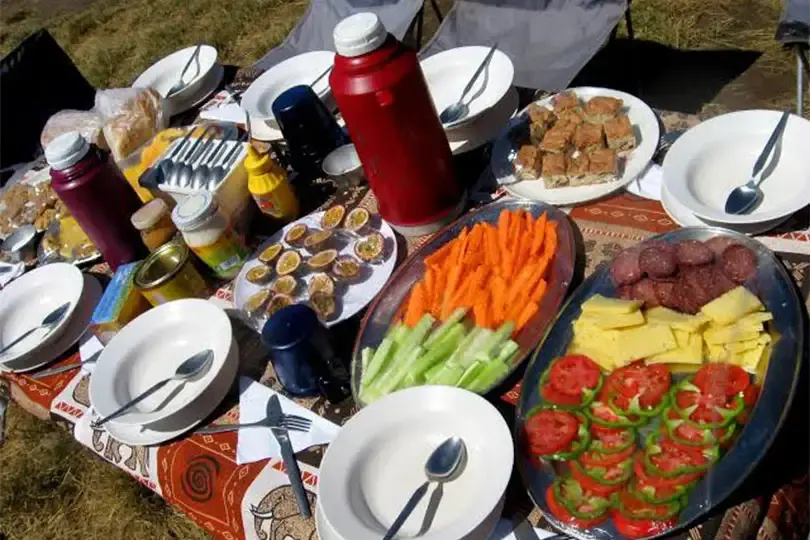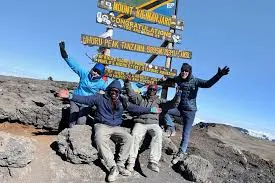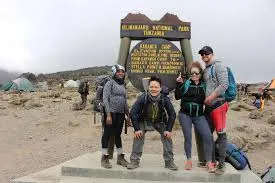What Meals to Expect on Your Kilimanjaro Trek
On a Kilimanjaro trek, you can expect simple, hearty meals that keep your energy up. Breakfasts often include porridge, eggs, and toast. Lunches usually consist of sandwiches, rice, or pasta with vegetables. Dinners feature warm, filling dishes like stews, soups, and sometimes meat, served with rice, potatoes, or chapati. Snacks such as fruit, nuts, or biscuits are available between meals. Staying hydrated is important, so tea, coffee, and plenty of water are provided throughout the day. From warm breakfasts to energizing snacks, our menu supports your journey through Kilimanjaro’s diverse climates, which range from rainforest to arctic summit. You’ll learn what meals to expect, how they’re prepared, and tips to stay nourished for a successful summit.
Plan Your Kilimanjaro Trek Now
Why Nutrition Matters on Kilimanjaro
Nutrition matters for Kilimanjaro because your body is under constant stress from altitude, cold, and long hikes. Eating the right mix of carbs, proteins, and fats keeps your energy steady, helps muscles recover, and supports acclimatization basically, good fuel makes the climb safer and more enjoyable. Proper nutrition is critical to maintain energy, combat altitude effects, and ensure summit success. Capable Africa Tours designs menus with high-carb, high-protein meals to fuel your body through five climate zones, from humid rainforests (80°F) to freezing summits (0°F). Below, we detail what meals to expect, their nutritional value, and how they’re prepared to keep you strong.
Daily Meal Structure on Kilimanjaro
| Meal Type | Timing | Examples | Nutritional Focus |
|---|---|---|---|
| Breakfast | 6:00–7:00 AM | Porridge, eggs, toast, fruits, coffee/tea | Carbs for energy, protein for muscle recovery |
| Lunch | 12:00–2:00 PM | Sandwiches, soups, pasta, vegetables | Balanced carbs, proteins, and hydration |
| Dinner | 6:00–7:00 PM | Rice, ugali, stews, chicken, vegetables | High-calorie, protein-rich for recovery |
| Snacks | Throughout the day | Nuts, dried fruits, energy bars, biscuits | Quick energy boosts, electrolytes |
Sample Kilimanjaro Trek Menu
- Day 1 Breakfast: Oat porridge with honey, scrambled eggs, toast with jam, fresh mango, coffee/tea (800–1,000 kcal).
- Day 1 Lunch (Packed): Chicken sandwich, vegetable soup, boiled egg, banana, cookies (700–900 kcal).
- Day 1 Dinner: Beef stew with rice, sautéed greens, avocado salad, fruit dessert (900–1,200 kcal).
- Day 2 Breakfast: Pancakes with syrup, sausage, pineapple slices, hot chocolate (800–1,000 kcal).
- Day 2 Lunch: Pasta with tomato sauce, cucumber salad, apple, energy bar (700–900 kcal).
- Day 2 Dinner: Ugali with chicken curry, mixed vegetables, papaya slices (900–1,200 kcal).
- Snacks (Daily): Trail mix (nuts, raisins), biscuits, energy bars, popcorn (200–400 kcal per serving).
Nutritional Breakdown
| Nutrient | Daily Intake | Purpose |
|---|---|---|
| Carbohydrates | 400–600g | Primary energy source for trekking |
| Protein | 100–150g | Muscle repair and recovery |
| Fats | 80–120g | Long-term energy, warmth at high altitudes |
| Calories | 3,500–5,000 kcal | Fuel for 6–10 hours of daily trekking |
| Hydration | 3–4 liters | Prevents dehydration, aids altitude acclimatization |
How Meals Are Prepared on Kilimanjaro
Capable Africa Tours ensures fresh, safe, and delicious meals on Kilimanjaro, prepared by trained camp chefs using portable stoves. Porters carry fresh ingredients like vegetables, fruits, and meats, supplemented by lightweight staples like rice and pasta. Meals are cooked daily in hygienic conditions, with purified water used for cooking and drinking. Breakfast and dinner are served hot in a communal dining tent, while lunch is often packed for on-trail convenience.
Key Features of Meal Preparation
- Fresh Ingredients: Locally sourced vegetables, fruits, and meats for maximum freshness.
- Hygienic Practices: Chefs follow strict hygiene protocols to ensure food safety.
- High-Altitude Adjustments: Menus are lighter at higher altitudes to aid digestion.
- Dietary Accommodations: Vegetarian, vegan, gluten-free, and other diets catered with prior notice.
- Purified Water: Boiled or chemically treated water provided at camps and during hikes.
Watch How We Prepare Meals on Kilimanjaro
See how Capable Africa Tours’ chefs craft nutritious, delicious meals to fuel your Kilimanjaro trek, from camp setup to fresh cooking.
Top Tips for Nutrition on Kilimanjaro
To maintain energy and stamina on Kilimanjaro, focus on eating balanced meals that include complex carbohydrates, lean proteins, and healthy fats. Snack on trail mix, energy bars, and dried fruit for quick fuel during the climb. Drink water consistently throughout the day—aim for 3–4 liters—and use electrolyte powders or rehydration salts to replace minerals lost through sweat. Prioritize foods that are easy to digest and nutrient-dense to support recovery at high altitudes. Below is a practical list of top nutrition tips to keep you strong and energized throughout your 6–9 day trek with Capable Africa Tours.
- Eat Consistently: Consume small, frequent meals to maintain energy without overloading your stomach.
- Prioritize Hydration: Drink 3–4 liters of purified water daily to combat altitude sickness and dehydration.
- Boost Electrolytes: Use electrolyte tablets or powders in your water to replace salts lost through sweat.
- Bring Familiar Snacks: Pack lightweight snacks like energy gels or chocolate for comfort and quick energy.
- Inform Dietary Needs Early: Notify Capable Africa Tours of any dietary restrictions at booking for tailored meals.
- Eat Light at Altitude: Opt for easily digestible foods like soups and pasta above 12,000 feet to avoid nausea.
Ready to Climb Kilimanjaro with Capable Africa Tours?
Fuel your Kilimanjaro trek with delicious, energy-packed meals from Capable Africa Tours. Our expert guides, tailored menus, and all-inclusive packages ensure a safe and unforgettable summit experience.
- 98% summit success rate with experienced guides
- Nutritious meals tailored to dietary needs
- Eco-conscious treks supporting local communities
- Gear rentals and customizable routes
- All-inclusive packages with meals and transfers
Limited spots available for Kilimanjaro treks — book now to secure your summit adventure!
Plan Your Trek Now


